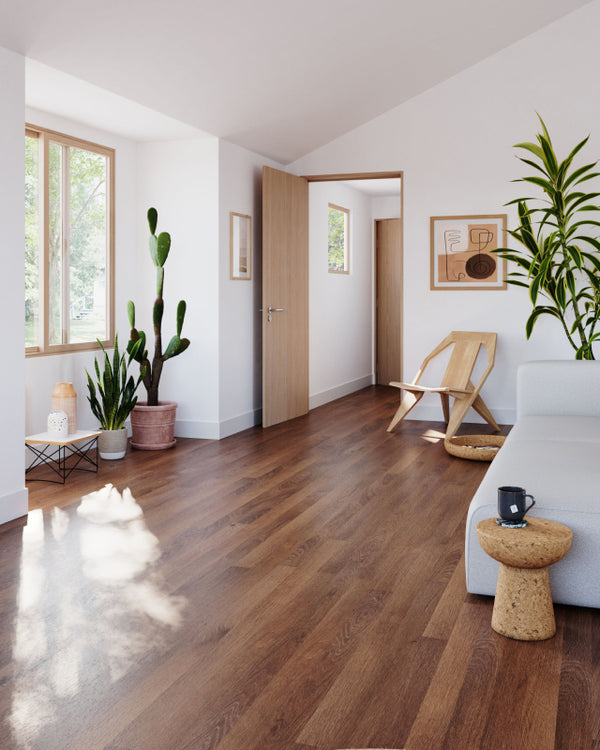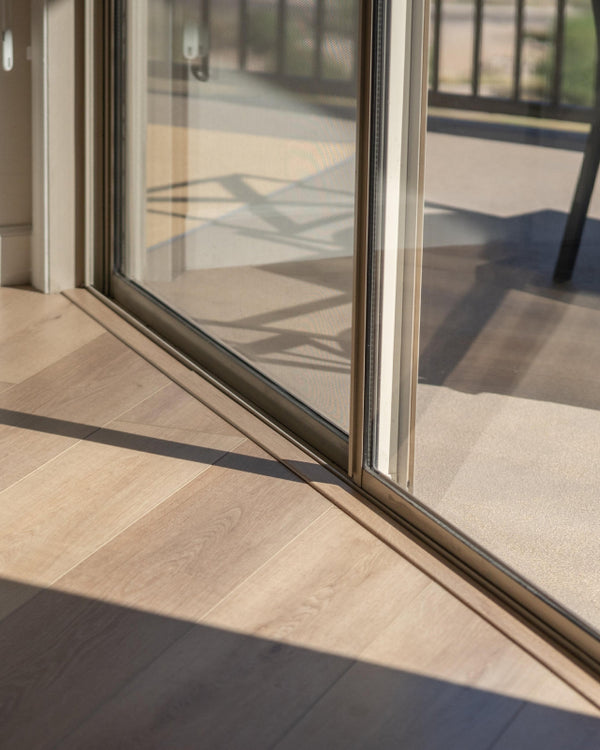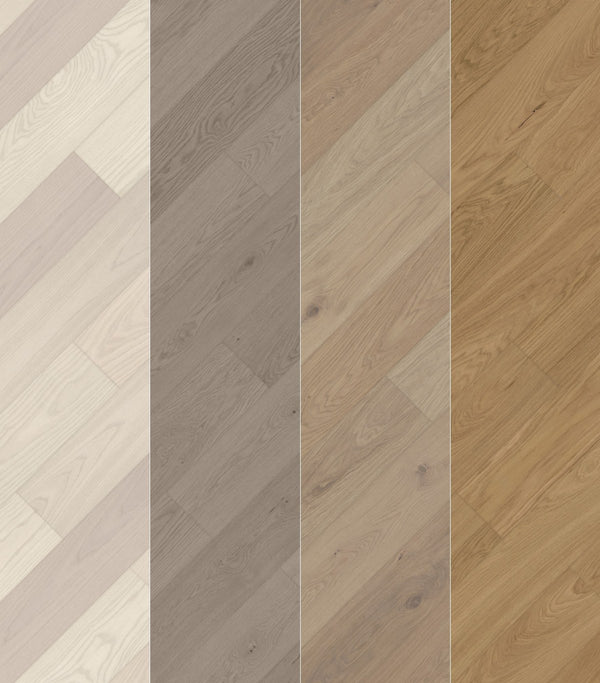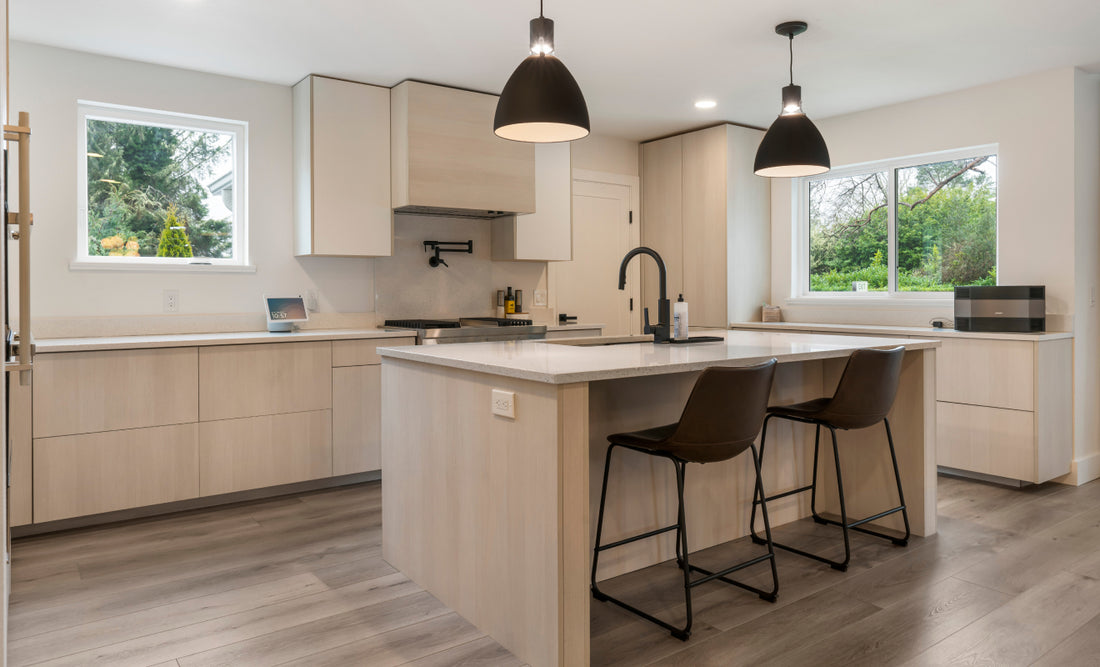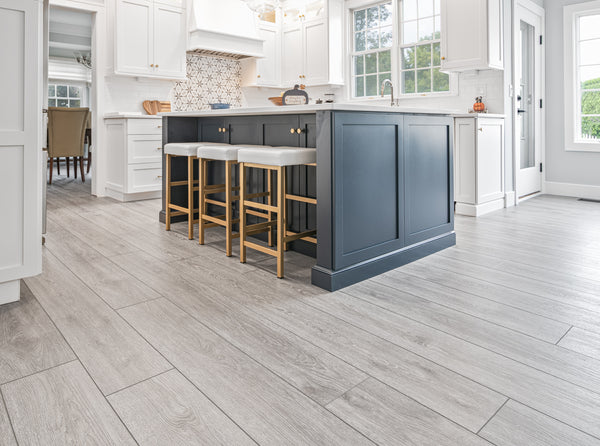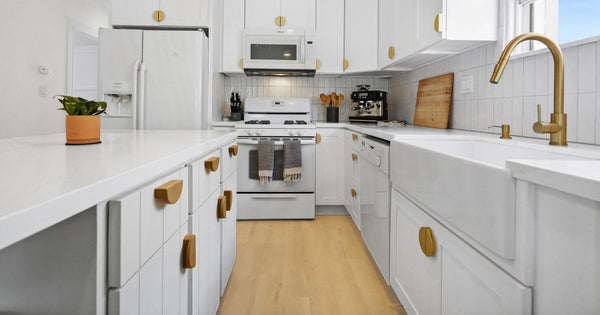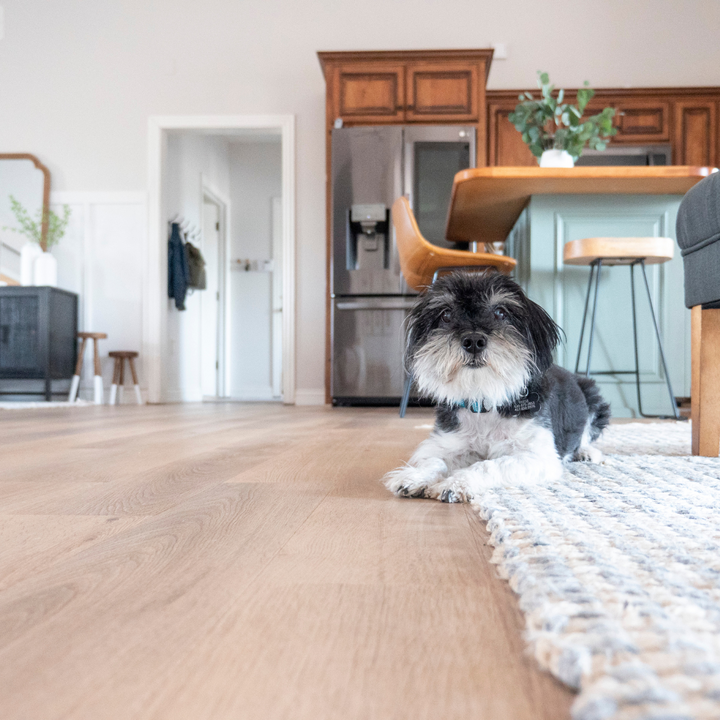When most people think about the safety of the floors in their home or business, they tend to mentally check off factors such as good traction, lack of buckling or uneven surfaces that could cause trips or falls, or maybe even the fire safety of the flooring material.
One critical aspect that gets overlooked in the flooring selection process is the potential toxicity of the flooring material and its propensity for trapping allergens.
Air quality and allergen exposure should always be considered when purchasing flooring material, especially if you or someone in your family suffers from a compromised immune system or respiratory issues, such as allergies or asthma.
To help make the choice that's best for your space and the people in it, let’s dive deeper into the material your floors are made of and the effect that could have on the health of your family, employees, or pets.
Why Does This Matter?
Both toxicity and allergens can directly impact your health and well-being.
The floor that you walk on also plays a part in determining the indoor air quality (IAQ) of your home or business, meaning that floors with toxins or those that hold onto dust and allergens might be contributing toward issues such as respiratory problems, allergies, asthma, headaches, or fatigue.
Flooring that contains VOCs (volatile organic compounds) can also affect your health adversely.
VOCs are chemicals found in various products and materials, including flooring. They vaporize at room temperature and mix with the air you breathe, making them another significant contributor to indoor air pollution and something that should be avoided in materials in your home or business.
But these risks are not true of all flooring, as some flooring material is known to be more of a concern than others.
Popular Flooring Types and How They Rank For Allergies and VOCs
Here are some popular flooring materials and how they can affect the indoor air quality of your home based on their ratings for allergens and VOC emissions.
Laminate
Allergy Rating: Great
VOC Rating: Not So Great
Laminate flooring, while a cost-effective and versatile option for your home, is considered the highest risk for VOC (volatile organic compounds) emissions and one that you should research before purchasing.
The problem lies in its construction.
Laminate flooring usually consists of a core layer made of fiberboard, which is often bound together using adhesives that use formaldehyde-based resins. And while formaldehyde is a naturally occurring VOC, the synthetic form of it is not something you want to breathe in regularly.
Products containing formaldehyde continue to emit the gas (a process known as off-gassing) into the air. While not harmful when it occurs outdoors, off-gassing can be problematic indoors, especially in warmer weather or in an area of your home or business with poor ventilation.
Though the levels of formaldehyde off-gassing decrease over time, a laminate floor can continue off-gassing in your home for months or possibly years after installation.
It’s important to note that not all laminate flooring products have this issue. If your heart is set on laminate, be sure to choose material from a reputable manufacturer and, if possible, look for a product that has been certified as low-VOC or one that has been completely off-gassed before purchase.
As for allergens, laminate is a hard surface floor; routine sweeping and the occasional mop should be enough to keep dust and allergens off the surface and keep your home allergy-friendly.
LVP
Allergy Rating: Great
VOC Rating: Great
LVP (Luxury Vinyl Plank) is another cost-effective and versatile home option.
Unlike laminate, however, it is very low in VOC emissions and does not usually require an extensive off-gassing process to be safe in your home or business.
Its manufacturing and installation process does not require harmful adhesives, keeping LVP a naturally safe flooring material. Make sure the LVP you select uses 100% virgin PVC, and if you choose to install a glue-down option, check that the adhesive you’re using is non-toxic.

Featured: Soho Base from the Modin LVP Collection
Since LVP is smooth and non-porous, it is unlikely to trap allergens like dust, pollen, or pet dander. As long as you clean your flooring, you shouldn’t be at any risk of dust buildup. Sweeping/vacuuming and the occasional mop should be all you need to keep dust and allergens off your floors and out of the air you and your family breathe.
Notably, LVP is not to be confused with vinyl sheet flooring, which, while fine for allergies, can often contain VOCs that are harmful to air quality during its off-gassing period. Look for a vinyl floor certified as safe for indoor air quality.
Our Modin LVP collection is an excellent example of a zero VOC flooring option and is also Assure-certified and FloorScore-certified as safe for any space.
Natural Hardwood
Allergy Rating: Great
VOC Rating: Depends
Like most hard surface floors, natural hardwood floors are allergy-friendly.
When properly sealed and installed, hardwood floors do not trap dirt, dust, or other allergens, so simply keeping your hardwood floors clean with routine sweeping and an occasional mop with a damp cloth is enough to keep your floors free of anything that could cause your allergies to flare up.
As for VOCs, solid hardwood floors emit few VOC emissions in their natural state.
To ensure that your hardwood floors remain low emission in your home, be aware of what finish is used on your floors since it's the finish and curing process that often emits VOCs and leads to off-gassing.
Look for non-toxic wood floor finishes that do not contain petroleum-derived solvents to ensure your floors are safe from the moment they are installed.
Engineered Hardwood
Allergy Rating: Great
VOC Rating: Depends
Engineered hardwood is a type of flooring that consists of multiple layers of wood, all stacked and bonded together, with a top layer of 100% natural hardwood.
Because derived from and topped with natural hardwood, it stands to reason that it has similar allergy and VOC ratings.
It’s a hard surface, so routine sweeping and an occasional mop with a damp cloth are enough to prevent dust build-up and other allergens from setting up shop on your floors.

Featured: Anza 7 from the Silvan Resilient Hardwood Collection
While VOC emission levels can vary, choosing engineered floors from a reputable manufacturer that uses adhesives, sealants, and finishes specifically designed to be low emission is your best bet for optimal indoor air quality in your home. Make sure the engineered hardwood you select has 3rd party certifications that ensure it is safe for your space.
Our Silvan Resilient Engineered Hardwood Collection is an excellent example of a low-emission, natural flooring option. It is Greenguard Gold certified, CARB Compliant, and guaranteed safe to install in your space.
Carpet
Allergy Rating: Not so Great
VOC Rating: Depends
While carpet can create a cozy and warm atmosphere and a luxurious barefoot experience, it may not be your best choice for maintaining optimal IAQ in your home, especially if it’s installed in a poorly ventilated area.
Because carpet is made from fiber, it naturally traps and retains dust, mites, allergens, and pollutants, which can contribute to lower air quality and nose, throat, and eye irritation if not vacuumed and maintained regularly.
In addition to being a nightmare for allergies, carpet can be a challenge to thoroughly clean after a spill (or if something is tracked in from outside), making it more susceptible to mold. Carpet is also the flooring choice most likely to harbor bacteria and other allergens deep in the padding, which not even the most powerful vacuums can reach.
Lower-quality carpet, adhesives used during installation, and certain backing or padding materials may also emit VOCs. These VOCs can come from the materials used, such as synthetic fibers or the manufacturing process itself.
If you’ve got your sights set on carpet, it’s best to invest in your health and opt for high-quality carpet that has been tested and certified for low VOC emissions. That's why Angela chose to completely replace her carpets with Sutton Signature from our Modin LVP Collection when she noticed her son was suffering from the pet hair stuck in the carpet from previous homeowners.
If you suffer from allergies, it’s best to steer clear of carpet entirely. Your sinuses will thank you.
Certified Safe Flooring from Flooret

Because the health and well-being of our customers are of utmost concern to us at Flooret, we are proud to offer flooring that has passed rigorous safety tests and can boast certifications to guarantee low emissions and risk of allergens.
This guarantees that our LVP and Engineered Resilient Hardwood collections are all safe for homes and commercial spaces with families, pets, and children.
Here are some of the certifications you will see on our products.
FloorScore Certified — FloorScore is the most recognized indoor air quality certification standard for all hard surface flooring materials, adhesives, and underlayments.
To be considered for certification, flooring material must pass rigorous testing requirements designed to detect unacceptable levels of elements such as formaldehyde, acetaldehyde, and other organic chemicals.
GreenGuard Gold Certified — GreenGuard certification is an indoor air quality certification standard for various products, including flooring materials, building materials, furniture, education and healthcare products, cleaning and personal products, and electronic equipment.
To obtain a GreenGuard Certification, these products must meet strict chemical emission limits for VOCs.
A product labeled GreenGuard Gold meets even more stringent requirements. It identifies products as safe for use in sensitive areas such as schools, daycares, nursing homes, and healthcare facilities.
Assure Certified — Assure Certified establishes a North American standard for all globally-manufactured rigid core vinyl flooring products.
To qualify to be Assure Certified, vinyl flooring products must be tested to the highest standards to ensure that the flooring product meets all standard requirements for indoor air quality, rigorous performance, and low heavy metals and ortho-phthalates content.
CARB Compliant — CARB, or California Air Resources Board, is an organization responsible for regulating air quality and emissions in California.
Composite wood products like building materials, furniture, toys, and other children’s products can be certified CARB Compliant if they meet the current emission standards for harmful emissions, like toxins and other particulates
Flooring You Can Trust
If you’re in the market for a new floor that is beautiful, cost-effective, and guaranteed to be safe for your home and everyone inside, you can’t go wrong with Flooret.

Featured: Soho Signature from the Modin LVP Collection
No matter which collection you choose, you can buy with confidence and know that the floors in your home will look great, be easy to maintain and, most importantly, contribute to optimal levels of indoor air quality in your space.
Check out our FloorScore-certified and GreenGuard Gold-certified collections to find the perfect foundation for your home. If you need help finding the perfect floor for your space, you can reach out to our expert support team at any time. We’re always happy to help!
